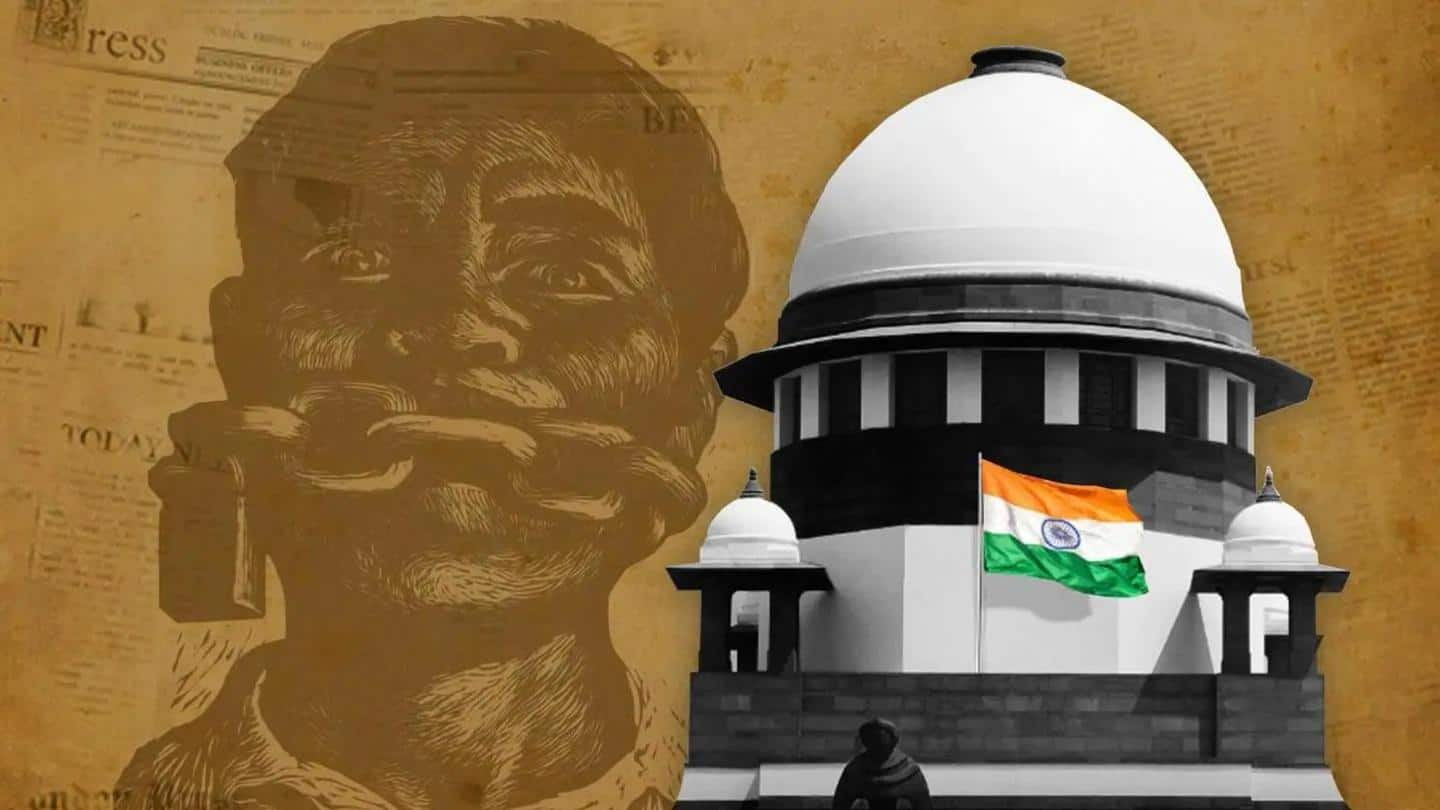
Sedition: Supreme Court's historic judgment puts law on hold
What's the story
In a historic decision, the Supreme Court on Wednesday put a stay on exercising the sedition law.
The SC asked the Centre and states to refrain from registering FIRs invoking sedition charges until further re-examination.
Chief Justice of India NV Ramana said it will be appropriate to not use the law.
Those booked under Section 124A of IPC can approach courts, the CJI said.
Context
Why does this story matter?
The sedition law has been facing criticism with many raising concerns over the government's misuse of the law to target its critics.
The legality and constitutional validity of the British-era legislation have also been questioned.
Interestingly, between 2016 and 2019, the number of cases filed under Section 124A jumped 160%, but the rate of conviction declined to 3%.
Historic ruling
Restrain from lodging new sedition cases: SC to Centre, states
A three-judge SC bench noted that it would be appropriate to not use the sedition law until the law is still under the government's review.
Central and state governments have been asked to refrain from registering fresh FIRs, continuing probes, or taking coercive actions under the law.
The bench comprised CJI NV Ramana and Justices Surya Kant and Hima Kohli.
Misuse
What the top court said about fresh cases
The top court said that if any fresh cases are filed, the concerned parties might approach the court and request to dispose of the same expeditiously.
The SC added: "Centre shall be at liberty to issue directives proposed and placed before the court which can be issued to states to prevent misuse of 124A. Directions to continue till further orders."
Centre's proposal
Sedition should be filed if SP-rank officer deems fit: Centre
The Centre told the SC that putting sedition cases that have been already filed on hold might not be a correct approach. Instead, the way such cases are filed should be changed.
Solicitor General Tushar Mehta proposed to the court that a Superintendent-rank police officer or above should scrutinize and decide on whether a sedition charge should be filed in future FIRs.
Centre to SC
Need to trust courts for pending cases: Solicitor General
On the issue of pending cases before the judicial forum, Mehta said, since the gravity of each case is not known—there could be a terror angle or money laundering—"we need to trust the courts."
"These pending cases are not before police or government. But they are before the court. So, we should not guess the wisdom of courts," Solicitor General Tushar Mehta said.
Previous stance
Last week, Centre had defended sedition law
On Saturday, the Centre upheld the sedition law's constitutional validity, citing the SC's 1962 Kedar Nath Singh judgment.
It said the law and the 1962 judgment have withstood the test of time and its misuse can never justify the need for reconsideration.
On Monday, however, it took a U-turn and informed the SC it had decided to review the law.
Current matter
Petitions challenging sedition law
The apex court is considering a clutch of petitions challenging the validity of the sedition law.
These were filed separately by former army officer SG Vombatkere, the Editors Guild of India, Trinamool Congress MP Mahua Moitra, NGO PUCL, and a few journalists.
Earlier, the SC asserted its primary concern is the law's "misuse," which has led to a rise in sedition cases of late.
Opposing views
Kapil Sibal calls Centre's proposal unacceptable
Opposing the Centre's stand, advocate Kapil Sibal—who was representing the petition challenging the sedition law—called the government's proposal unacceptable.
He added the issue of scrutinizing the registration of FIR should not go to anyone.
On the issue of bail applications, Mehta said that since there was no accused before the court, "to entertain in a PIL may be a dangerous precedent."
About
What exactly is sedition?
In popular parlance, sedition is assumed to be an anti-national act. However, in legal terms, sedition is an anti-government act.
It is not a different act by Parliament but is part of the Indian Penal Code (IPC) Section 124A.
Notably, in 1870, British historian and politician Thomas Macaulay drafted Section 124A. Reportedly, however, the term "sedition" itself wasn't originally mentioned in this IPC Section.
Constitutional validity
SC's 1962 Kedarnath Singh vs State of Bihar case judgment
In 1953, Kedar Nath Singh—a Forward Communist Party member—had said at a Bihar rally: "The dogs of the CID are loitering around. We will strike...throw out these Congress goondas (hired criminals)."
Later, in 1962, the SC convicted Singh, upholding the constitutional validity of the sedition law.
However, it clarified criticism of the government cannot be labeled sedition unless accompanied by a call for violence.
Quashed sedition charges
What had the SC ruled in the Vinod Dua case?
In June 2021, the Supreme Court quashed sedition and other charges against journalist Vinod Dua by a Himachal Pradesh BJP leader for making critical comments against the central government and PM Narendra Modi.
The top court had ruled, "Every journalist is entitled to the protection under the Kedar Nath Singh case (which defined the ambit of offense of sedition under Section 124A IPC)."